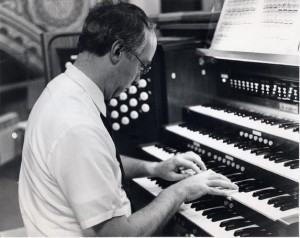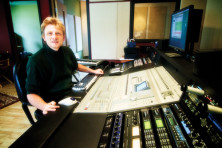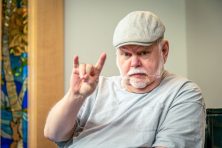A Life in Music
- Share
- Tweet
- Pin
- Share
There lies in every person at least a touch of the unexpected. Not of the exceedingly remarkable or hidden secret variety, but the sort of small thing that broadens your view of someone a bit when you hear it.
There’s the mellow coworker who loves hair metal, the nun who enjoys an occasional beer and a ballgame, or the jock who frequents the theater.
Don Richter was known to most as a long-time choir director and musician. But this man of music was also a handyman with an uncommon fascination – vacuums, an obsession he traced to their operation. They worked much like his favorite instrument, he claimed, the pipe organ. He loved to take vacuums apart, rebuild them, and hunt them down.
“We’d be driving home and if there was one on the side of the road, you just hoped Dad wouldn’t see it,” remembered his daughter, Valerie. “But he always did, and you knew it was coming home with us.”
His only son, Mike, could only shake his head and laugh at the memory of his dad stopping the car and sending one of the kids to grab a neglected old vacuum.
“He could see vacuums better than deer when he was driving at night,” Mike said.
Once home, Don would go to work taking it apart, like a kid rushing off to play with a new toy. He didn’t much care for the fancy modern models. He coveted the old metal behemoths like the Filter-queen, Royal, or Electrolux beasts, the kind that made moms strong and lasted for decades. He always had a handful at the house, and he’d fix them up and give them away to friends and family (whether they needed one or not).
Mike said it was just another way for him to give something to others, which is what he always tried to do, especially music, the great passion of his life. He was a gifted pianist, for which he thanked God, and as long as he was able, he used his life to share that gift.
That giving came to an end May 7, when Don Richter, who played organ for over three decades at Green Bay’s St. Francis Xavier Cathedral and then at St. Rosalia’s Church in Sister Bay, died at age 63 of complications associated with frontal temporal dementia. His life of music also included 11 years as musical director of the Peninsula Chamber Singers, during which he expanded the all-are-welcome ensemble’s repertoire and esteem, and he was also a member in The Doormen, a peninsula vocal troupe.
Prior to moving to Ephraim in 1994 with his wife Fran and three children, he taught choir at Abbott Pennings High School and Notre Dame Academy.
Richter built his first pipe organ in the basement of his parents’ home as a high school senior in 1963, and would continue building, playing, and tinkering with organs for the rest of his life.
In 1986 he helped design a $300,000 Wicks Organ at St. Francis Xavier Cathedral in Green Bay, his proudest musical achievement. Shortly after arriving at St. Rosalia’s, he expanded the church choir and spearheaded the effort to raise funds to buy a new $30,000 pipe organ for the church.
He and his students played Carnegie Hall several times, but he was not a musical elitist. When he came to Door County, he proved a perfect fit to lead the Peninsula Chamber Singers, which welcomes all who want to sing without auditions or qualifications.
“The most important message he gave people was that if they could hear the music, they could sing and learn the music,” friend Jean Casey remarked at his funeral. “He pulled music out of people.”
His children and pupils say he was always in search of a new way to get his message across to his pupils, rarely relying on simply commanding.
“He made you feel important, regardless of how good your were,” Valerie said.
Don prayed through his music, his family said, one reason he worked so hard at it, and he was fond of reminding his pupils that “nobody ever walked out of the church humming a homely.”
His ability to communicate with his students was his great strength, as he tried to find common ground through stories and humor.
But in 2007, he was diagnosed with a rare disease that robbed him of his communication skills. Pick’s Disease, an extremely rare form of frontal temporal dementia, was changing him. The debilitating disease set in rapidly, manifesting itself not in memory loss, but in behavioral and personality changes. Mike said the disease is not a 24/7 affliction, and early on his father’s symptoms would come and go.
“He could be fine for a while, then bad again,” he explained.
His family was grateful for one forgiving aspect of the disease – it let Don hold on to his music, almost to the end. About 14 months ago he lost most of his ability to communicate. Answers would come in one or two words. “He couldn’t elaborate on his thoughts anymore,” Mike said. Don spent hours glued to the television and his muscles deteriorated, but the music kept him in touch, and gave his family and friends a part of their old friend to hold onto in his final years.
He continued to play funerals and occasional concerts, striving to fulfill what he considered his obligation to the church. Over the last year, his performance slipped, and he had to leave the bench.
Unmercifully, the disease was stealing the music he had held so tightly since he was 12, when he got his first job teaching piano lessons to adults, beginning a life of sharing.
It was one of his dad’s greatest lessons, Mike said. Don showed his children how to give back to others the gifts bestowed on them.
“There was so much room in his heart,” Mike said, “because he didn’t focus on himself.”



